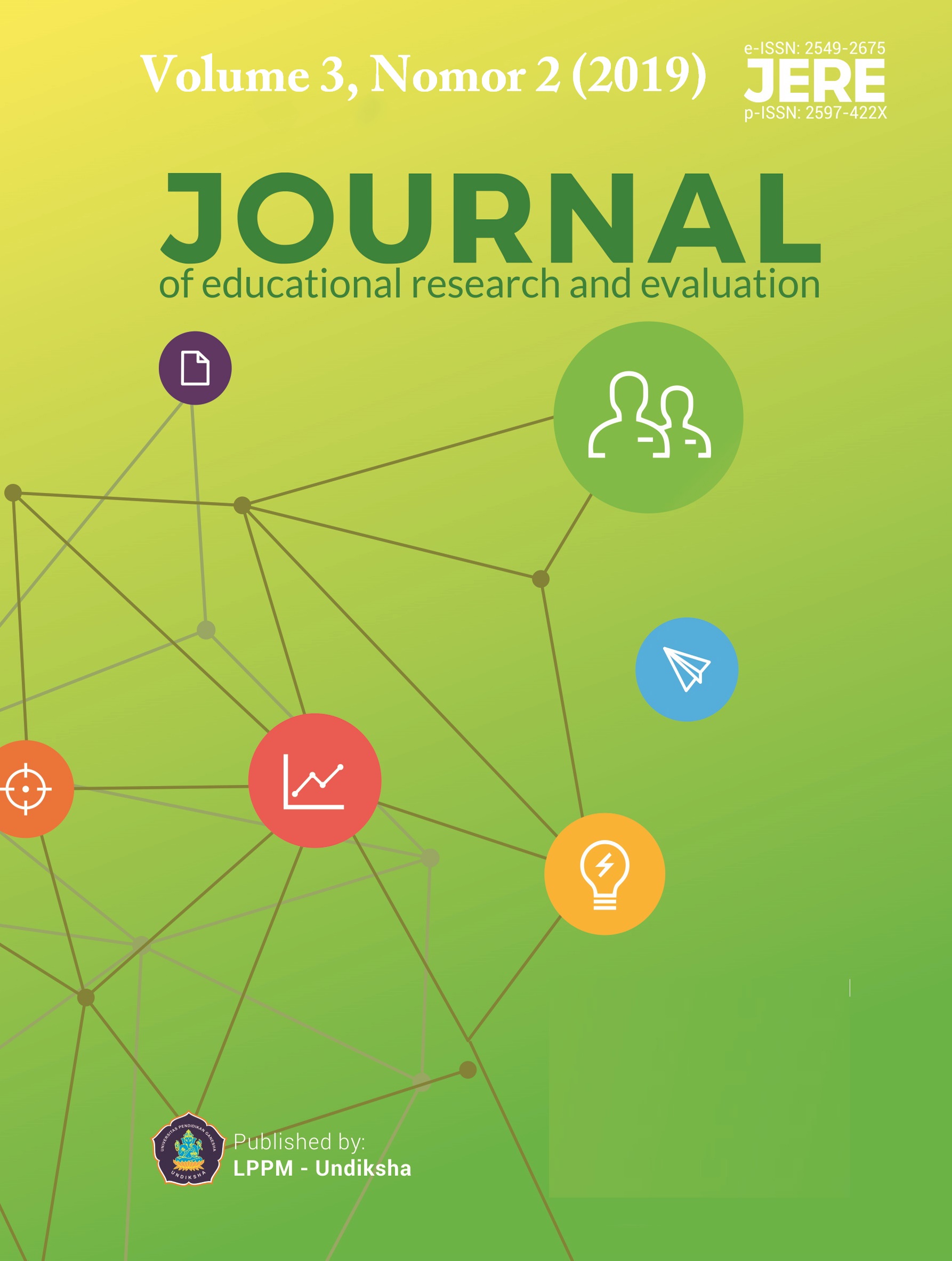Effectiveness of E-Learning Media to Improve Learning Outcomes Natural Science in Primary Schools
DOI:
https://doi.org/10.23887/jere.v3i2.17203Keywords:
E-Learning, Learning Outcomes, Natural Science, Primary SchoolAbstract
This study aims to determine the effectiveness of the application of e-learning media in science lessons on the learning outcomes of fourth-grade students in primary school. Experimental research was conducted for four weeks with learning using e-learning media as an experimental group (n = 32) and using book-based learning as a control group (n = 30). This study used a quasi-experimental method with a pre-test and post- test control group design. The research instrument was taken from observations and scores on student learning outcomes. The data were analyzed using quantitative statistical tests. Based on the data, the researchers know that a teacher plays an important role in developing student learning media through ICT-based e-learning learning design. Also, the results of the study based on the Mann-Whitney N-gain score of students' comprehension ability obtained a significance value of 0.00 <α = 0.05. So that H0 was rejected. This result shows that the ability of students to understand science using e-learning media is significantly better than students who get book-based learning.
References
Benninga, J.S., Berkowitz, M.W., Kuehn, P. & Smith, K. (2006). Character and Academics: What Good Schools Do. Phi Delta Kappan 87(6), 448–452.
Chu, S., Chow, K., Tse, S.K., Kuhlthau, C.C. 2008. Grade Four Students’ Development of Research Skills through Inquiry-Based Learning Projects. Hongkong: School Libraries Worldwide 14(1), 10–37.
Clark, Ruth., E. Mayer, Richard. 2008. E-learning – second edition. New York: Pfeiffer.
Cohen, L., Manion, L. ve Morrison, K. 2005. Research Methods in Education (5th Edition). London, NewYork:
Routledge Falmer. Conference Board of Canada.
Dabbagh, N. & Bannan-Ritland, B. 2005. Online Learning. Concept, Strategies, and Application. Upper Saddle Rive, NJ: Pearson Education, Inc.
Dabbah, N. H., Jonassen, D. H., Yueh, H. P. & Samouilova, M. 2000. Assessing a Problem-Based Learning Approach to an Introductory Instructional Design Course: A case study. Performance Improvement Quarterly, 13(3), 60-83. DOI= 10.1111/j.1937-8327.2000.tb00176.x.
Goda, W.W.L., Bay, S., & Chen, V.H.H. 2017. Young school children’s use of digital devices and parental rules.
Telematics and Informatics, 32, 787-795.
Hmelo-Silver, C. 2004. Problem-Based Learning: What and How do Students Learn? Educational Psychology Review, 6, 235-266. DOI= https://doi.org/10.1023/B:EDPR.0000034022.16470.f3.
Munir. 2009. Mata Pelajaran Berbasis Teknologi Informasi dan Komunikasi. Bandung: CV. Alfabeta.
Permendikbud 021. 2016. Tentang Standar Isi Kurikulum 2013. Jakarta: disalin oleh Biro Kementrian Pendidikan dan Kebudayaan Tinggi Depdiknas.
Prensky, Marc. 2001. Digital Game-Based Learning, Chapter 5: Fun, Play and Games: What Makes Games Engaging. McGraw-Hill.
R.R. Hake. 1999. Analyzing Change-Gain Scores. USA: Dept. of Physics, Indiana University. http://www.physics.indiana.edu/~sdi/AnalyzingChange-Gain.pdf.
Railsback, J. 2002. Project-based Instruction: Creating Excitement for Learning. Northwest Regional Educational Laboratory, Oregon. http://educationnorthwest.org/sites/default/files/projectbased.pdf.
Rusman, dkk. 2011. Pembelajaran Berbasis Teknologi Informasi dan Komunikasi. Jakarta: Rajawali Pers.
Sisco, Ashley. 2010. Nations First for elearning of effectiveness the Optimizing. Ottawa: The
Samatowa, Usman. 2006. Pembelajaran IPA di Sekolah Dasar. Jakarta: Indeks.
Sukmadinata, Nana Syaodih. 2005. Metode Penelitian Pendidikan. Bandung: Rosdakarya.
Susanto, A. B. 2007. Corporate Social Responsibility. Jakarta: The Jakarta Consulting Group.
Whitten, Jeffrey L, et al. 2014. Metode Desain & Analisis Sistem, Edisi 6, Edisi International. Yogyakarta: Mc GrawHill, ANDI.
Downloads
Published
How to Cite
Issue
Section
License
Authors who publish with the Journal of Evaluation and Research in Education (JERE) agree to the following terms:
- Authors retain copyright and grant the journal the right of first publication with the work simultaneously licensed under a Creative Commons Attribution License (CC BY-SA 4.0) that allows others to share the work with an acknowledgment of the work's authorship and initial publication in this journal.
- Authors are able to enter into separate, additional contractual arrangements for the non-exclusive distribution of the journal's published version of the work (e.g., post it to an institutional repository or publish it in a book), with an acknowledgment of its initial publication in this journal.
- Authors are permitted and encouraged to post their work online (e.g., in institutional repositories or on their website) prior to and during the submission process, as it can lead to productive exchanges, as well as earlier and greater citation of published work. (See The Effect of Open Access)











